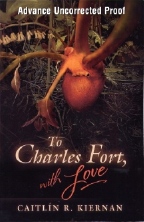To Charles Fort, With Love
Caitlin R Kiernan
Subterranean Press
US Hardcover First Edition
ISBN: 1-59606-034-4
Publication Date: September 2005
270 pages; $ 25.00
Date Reviewed: 07-17-05
Reviewed by Mario Guslandi © 2005

REFERENCES
COLUMNS
|
|
|
To Charles Fort, With LoveCaitlin R KiernanSubterranean PressUS Hardcover First EditionISBN: 1-59606-034-4Publication Date: September 2005270 pages; $ 25.00Date Reviewed: 07-17-05Reviewed by Mario Guslandi © 2005 |
|
|
REFERENCES |
COLUMNS |
One can seldom find an author capable of either delighting or boring her readers with the same ease as Catlin Kiernan, a fantasist whose idols include Charles H. Fort, the hunter of the weird and inexplicable in the universe -- as clearly shown by the dedication of the present book -- and H P Lovecraft, the famous creator of cosmic horror -- as discussed in the long introductory notes to the volume.
Kiernan's fiction addresses the supernatural lurking in the shadows, the parallel worlds existing behind the curtain of what we consider the real world. Ironically for a declared fan of the Providence recluse, among the Lovecraftian disciples there is no writer more distant than Kiernan from his literary model. Kiernan's languid, low-key writing style is aeons away -- to use a term dear to Lovecraft -- from the vivid, flamboyant tone of the beloved singer of the Old Ones.
Her plots are ethereal, sometimes a mere pretext for depicting offbeat atmospheres. This and the quiet narrative technique displayed by the author result in the production of a type of fiction where the risk of ennui is constantly around the corner. When Kiernan is able to successfully strengthen and fill out her bare style with captivating enough material, she manages to create wonderful pieces of dark fiction. When she fails we are presented with extremely boring stuff, also because Kiernan, even if a gifted writer, can hardly be considered a skilled storyteller.
The present short story collection is no exception, featuring a bunch of stories of remarkably uneven quality.
'Valentia', for example, a sort of paleontological whodunit mixed with elements of Irish folklore, is tedious stuff, told in a colourless manner. By contrast 'Spindleshanks' is an outstanding tale of lesbian love, quiet horrors from the last centuries and messages from beyond the grave, narrated with a restrained, essential style where not a single word is wasted.
Another good one is 'The Road of Pins', an ambiguous tale hinting at wolf-like hungry creatures from the past. The story manages to work despite the unpleasantness of the main character, a dull lesbian whose main activity seems to consist in having headaches. Very little happens in 'Standing Water', yet it is a neat piece of fiction where a mud puddle appears out of nowhere after a sequence of rainless days.
Parallel worlds and non-existent places are the subject of the award-winning 'Onion', a story engulfed in a dreary atmosphere of anguish and told in a slightly somnolent manner. 'Apokatastasis' is the upsetting report of a strange apparition on the bedroom's threshold and of an old painting where a new, freshly painted figure is taking shape. Again, a meditation on the border zone between reality and…
Kiernan admits she wrote 'La Peau Verte' when intoxicated. It's not hard to believe her, considering what a messy patchwork of fairy legends, psychoanalytic sessions, memories of dead siblings and chess games à la Ingmar Bergman constitutes the story's fabric.
Similarly, 'So Runs the World Away' and 'The Dead and the Moonstruck' are unlucky attempts to revisit Lovecraftian ghouls without a single spark of originality to counteract the general feeling of boredom.
More accomplished are the stories belonging to the so-called 'Dandridge Cycle'. 'A Redress for Andromeda' is an excellent, disquieting tale about the secret power of the sea and the unspeakable mysteries lying down in the deep in the cellar of an old house, as told by a new acolyte admitted to a group of worshippers. The haunted house by the sea returns in 'Nor the Demons' a very unemotional piece featuring an uneasy couple of lesbians on a car trip. Finally 'Andromeda Among the Stones' provides somehow an explanation for what was only hinted at in the previous two stories. Not entirely successful in terms of clarity due to the author's incurable fondness for ambiguity, the story conveys a strong impression of Kiernan's pessimistic view of the universe and of the human fate. If you like visionary but cryptic fiction you may find this collection remarkably interesting. If you prefer solid, straightforward storytelling you'd better keep off.